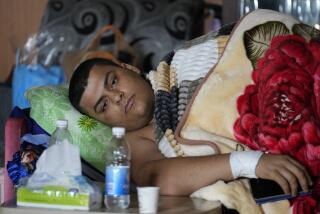24 Die in Iraqi Rebel Attacks
- Share via
BAGHDAD — Insurgents opened fire on a busload of laborers traveling toward a U.S. military base in Tikrit on Sunday, killing 17 of them and culminating a week of violence that left at least 80 Iraqis and 23 U.S. troops dead.
Sunday’s assault was the latest in a series of ambushes in predominantly Sunni Muslim areas; most of the attacks have targeted Shiite Muslims, ethnic Kurds and those working with the interim Iraqi government.
A bombing at a Shiite mosque in a Sunni neighborhood in Baghdad killed 17 people Friday, but Iraqi security forces have borne the brunt of the attacks. Insurgents attacked two police stations Friday and another early the next day. Also Saturday, a bus carrying Kurdish guards assigned to protect government property was blown up.
On Sunday, a suicide bomber killed four Iraqi national guardsmen near Baiji, north of Tikrit. Two more national guardsmen died in an attack near Latifiya, a Sunni-dominated town south of Baghdad, news agencies reported. And west of Samarra, insurgents opened fire on a joint U.S.-Iraqi convoy, killing six Iraqi national guardsmen, witnesses said. U.S. sources, however, said only one Iraqi died.
The U.S. military said three Americans were killed in action Sunday in two incidents in Al Anbar province, west of Baghdad. No further details were immediately available.
Calling the insurgents “forces of darkness,” interim Iraqi President Ghazi Ajil Yawer said Sunday that the goal of the “people who are committing these atrocities unjustifiably is to stop us from having our first chance to taste the harvest of liberating Iraq.”
With less than two months to the planned Jan. 30 elections for a transitional national assembly, violence and fear threaten to make elections difficult if not impossible in some areas of the country.
The insurgents and the interim Iraqi government appear to be in a race to convince Iraqi citizens that their side will prevail. But if government forces can gain some traction, officials might be able to persuade what Yawer called Iraq’s “silent majority” to participate in the vote despite the insurgents.
Yawer expressed confidence in Iraqi security forces and said that he thought the United States could begin to withdraw its troops within a year.
“In six months or eight months or a year” the troops can begin to be withdrawn, he said on NBC’s “Meet the Press.” “I don’t think it will take years.”
After suffering at least 136 troop deaths in November -- the most in any month since the war began -- U.S. officials announced last week that they would add 12,000 troops before January’s vote, bringing the total force to about 150,000. Yawer said until Iraqi security forces were adequately prepared, a U.S. withdrawal would be “bad for Iraq, the Middle East, the United States and the world.”
U.S. and Iraqi troops have less than eight weeks to improve security, particularly in Sunni areas, where daily attacks diminish the chance that many people will feel free to vote. An election with low Sunni participation would probably foster resentment and lead to deeper divisions with Shiites, who are the majority sect in Iraq but were repressed under Saddam Hussein’s Sunni-dominated regime.
Yawer, a Sunni, said that a majority of Iraqis longed to vote and wanted to resist sectarian warfare, but the combination of 30 years of Hussein’s rule and recent bloodshed had cowed people. “They are hibernating in caves,” he said.
Although many Sunnis would like elections to be delayed, the Iraqi president said he remained committed to holding elections by the end of January. He rejected the proposals of some Iraqi politicians to delay the elections and negotiate with insurgents to reduce the violence.
“How are we going to talk to these people?” asked Yawer. “They don’t have faces. They don’t have leaderships. They don’t have ideologies. They don’t have any demands. They are just there, wanting to bring the old regime back into Iraq.”
In Sunday’s attack in Tikrit, the insurgents found an easy target in the bus carrying the laborers, who work for a contractor at an arms dump just outside the U.S. military base. The bus passes the same way each morning when the laborers go to work, said Haj Zaki, a Tikrit native. Gunmen in two cars reportedly opened fire on the bus.
Authorities did not release any details on the victims’ identities, but many Tikrit residents believed they were Shiites from southern Iraq. Tikrit is Hussein’s hometown, and few locals are willing to work for the American military.
Laborers from southern Iraq in Tikrit were also attacked last month when a rocket slammed into a hostel where they were staying, killing 15 people. It was not clear, though, whether the hostel was the intended target of the attack.
In other developments Sunday, a top aide to Grand Ayatollah Ali Sistani, Iraq’s senior Shiite cleric, was detained overnight by U.S. forces on suspicion that he had ties to insurgents in Fallouja, sources in Sistani’s office said.
The detention of Mohammed Hashim Yahiya -- who coordinates on Sistani’s behalf with the independent Iraqi Electoral Commission and is helping to put together a slate of Shiite candidates -- spurred frantic negotiations among the American military, U.S. Embassy and Mowaffak Rubaie, Iraq’s former national security advisor who is currently in England. Late Sunday, Sistani’s office announced Yahiya had been released.
Aides indicated that Sistani was offended by the detention. The cleric has a reputation for rectitude and has come as close as possible to openly opposing the Sunni insurgency, particularly the guerrilla activities in Fallouja. In midafternoon, before negotiations were complete, a top official in Sistani’s office called the incident “serious and unjustified.”
Times special correspondents in Najaf and Samarra contributed to this report.
More to Read
Sign up for Essential California
The most important California stories and recommendations in your inbox every morning.
You may occasionally receive promotional content from the Los Angeles Times.










